key_points_in_Lecture_5
英语卷作文答题卡模板
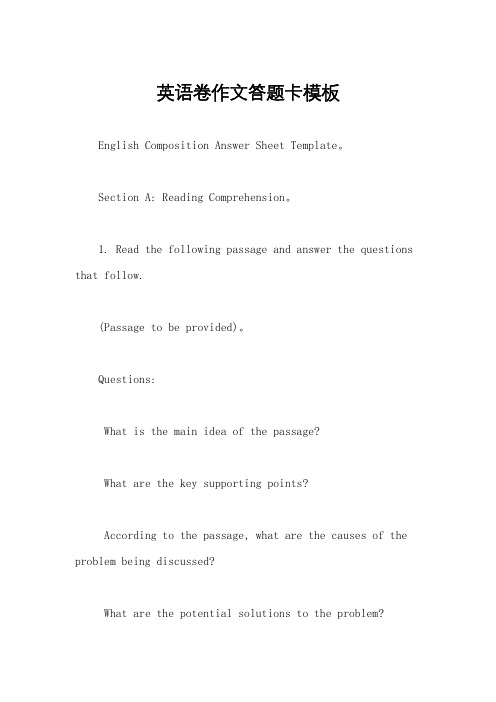
英语卷作文答题卡模板English Composition Answer Sheet Template。
Section A: Reading Comprehension。
1. Read the following passage and answer the questions that follow.(Passage to be provided)。
Questions:What is the main idea of the passage?What are the key supporting points?According to the passage, what are the causes of the problem being discussed?What are the potential solutions to the problem?2. Read the following poem and answer the questions that follow.(Poem to be provided)。
Questions:What is the theme of the poem?What are the literary devices used in the poem?How does the poem reflect the poet's personal experiences or emotions?Section B: Writing Task。
1. Essay。
Topic: Discuss the advantages and disadvantages of social media in modern society.Instructions:Write an essay of at least 500 words.Organize your essay into clear paragraphs.Provide specific examples and evidence to support your points.Conclude your essay with a summary of your main arguments.2. Short Story。
研究生学术英语读写教程unit5

Unit 5: Academic WritingAcademic writing is an essential skill for graduate students. Whether it's writing research papers, essays, or dissertations, the ability to conveyplex ideas in a clear and organized manner is crucial for success in academia. In this unit, we will delve into the keyponents of academic writing, including structure, language, and style, and offer practical tips for developing your skills in this area.1. Understanding the Structure of Academic WritingAcademic writing typically follows a specific structure that includes an introduction, body, and conclusion. The introduction should provide background information on the topic and clearly state the purpose of the paper. The body should present evidence, arguments, and analysis to support the m本人n thesis, while the conclusion should summarize the key points and reiterate the significance of the research. Understanding and following this structure is essential for producing coherent and persuasive academic writing.2. Developing an Academic Writing StyleAcademic writing requires a formal and objective tone. This means avoiding colloquial language, personal opinions, and emotional language. Instead, focus on using clear, precise, and formal language to convey your arguments and ideas. Additionally, pay attention to the use of citations and referencing to acknowledge the sources of your information and evidence. Developing a strong academic writing style takes practice, but it is a crucial skill for graduate students to master.3. Using Language Effectively in Academic WritingIn academic writing, it is important to use language that is precise and unambiguous. Avoid vague or ambiguous language, as this can weaken the clarity and effectiveness of your writing. Additionally, pay attention to the use of transitions and cohesive devices to ensure smooth and logical connections between ideas. By using language effectively, you can enhance the coherence and flow of your academic writing.4. Incorporating Research and EvidenceAcademic writing is heavily reliant on research and evidence tosupport arguments and cl本人ms. As a graduate student, it is important to develop strong research skills and the ability to critically evaluate sources. This includes identifying reliable and credible sources, synthesizing information from multiple sources, and effectively integrating evidence into your writing. By incorporating research and evidence, you can strengthen the validity and persuasiveness of your academic writing.5. Editing and Revising Academic WritingEffective academic writing is the result of careful editing and revision. After drafting your paper, take the time to review and revise it for clarity, coherence, and organization. Pay attention to the overall structure and flow of the paper, as well as the language, style, and tone. Additionally, proofread your work for grammar, punctuation, and spelling errors. By editing and revising your academic writing, you can ensure that it meets the highest standards of clarity and accuracy.ConclusionAcademic writing is a fundamental skill for graduate students, and mastering this skill is key to success in academia. Byunderstanding the structure of academic writing, developing a formal and objective writing style, using language effectively, incorporating research and evidence, and editing and revising your work, you can produce high-quality academic writing that is clear, coherent, and persuasive. With practice and dedication, you can continue to refine your skills in academic writing and excel in your academic pursuits.。
lecture 5 汉英词语翻译
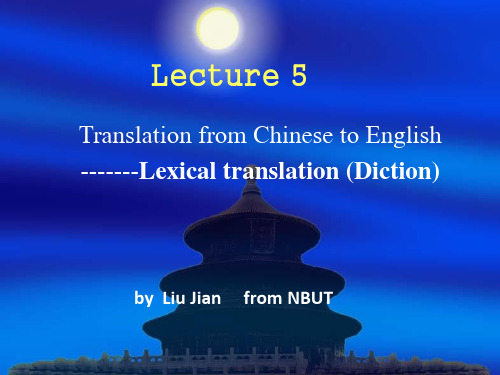
7). 昨天看电影我没有买到好票:
* I did not buy a good ticket for yesterday’s film. I did not buy a good seat for yesterday’s film.
8). 这所全国重点大学为社会输送了大批人才
(batches of )。 * The national heavy university has sent/transported batches of qualified talents to the society. The national key university has prepared batches of qualified graduates for the society. 9). 他们省吃俭用,为的是攒钱买房子。 * They save food and expenses to accumulate more funds to buy an apartment. They live frugally/economically/thriftily to accumulate more funds to buy an apartment.
Appropriateness in word selection-ii
To choose word according to the collocation 2). 好: 好教徒 好父母 好儿女 好妻子 好丈夫 3). 水平: 英语水平 生活水平 游泳水平
2) good a faithful/devout/pious/sincere/ devoted Christian/believer a loving/caring parent an obedient/filial child a virtuous/devoted wife a dutiful/responsible husband 3) level English proficiency/ level living standard swimming skill
托福写作评分标准

托福写作评分标准托福写作评分标准如下:新托福写作考试总共分为独立写作和综合写作两部分,它们有着不同的考察点,所以后面的托福考生了解每部分所测试的能力是非常重要的。
托福独立写作旨在考察考生是否有效回应题目,阐明*主题,*逻辑是否条理清楚及能否充分展开论证;内容是否连贯一致以及考生遣词造句的能力。
托福综合写作的考察在于总结归纳和改写两个方面,总结归纳的能力是说考察方希望考生能够在规定的时间内掌握一定长度和一定难度的阅读和听力材料中所涉及到的重点信息和论证结构;改写能力则要求考生将两部分材料中的重点信息和论证方式用新的语言和结构系统的进行展示和归纳。
托福独立写作评分标准(Independent Wring Rubrics)1.托福独立写作得5分情况An essay at this level largely accomplishes all of the following:●Effectively addresses the topic and task●Is well organized and well developed, using clearly appropriate explanations, exemplifications, and/or details●Displays unity, progression, and coherence●Displays consistent facility in the use of language, demonstrating syntactic variety, appropriate word choice, and idiomaticity, though it may have minor lexical or grammatical errorsAn essay at this level largely accomplishes all of the following:●Addresses the topic and task well, though some points may not be fully elaborated●Is generally well organized and well developed, using appropriate and sufficient explanations, exemplifi-cations, and/or details●Displays unity, progression, and coherence, though it may contain occasional redundancy, digression, or unclear connections●Displays facility in the use of language, demonstrating syntactic variety and range of vocabulary, though it will probably have occasional noticeable minor errors in structure, word form, or use of idiom-atic language that do not interfere with meaning3.托福独立写作得3分情况An essay at this level is marked by one or more of the following:●Addresses the topic and task using somewhat developed explanations, exemplifications, and/or details●Displays unity, progression, and coherence, though connection of ideas may be occasionally obscured●May demonstrate inconsistent facility in sentence formation and word choice that may result in lack of clarity and occasionally obscure meaning●May display accurate, but limited range of syntactic structures and vocabularyAn essay at this level may reveal one or more of the following weaknesses:● Limited development in response to the topic and task●Inadequate organization or connection of ideas●Inappropriate or insufficient exemplifications, explanations, or details to support or illustrate generaliza-tions in response to the task●A noticeably inappropriate choice of words or word forms●An accumulation of errors in sentence structure and/or usage5.托福独立写作得1分情况An essay at this level is seriously flawed by one or more of the following weaknesses:●Serious disorganization or underdevelopment●Little or no detail, or irrelevant specifics, or questionable responsiveness to the task●Serious and frequent errors in sentence structure or usage6.托福独立写作得0分情况An essay at this level merely copies words from the topic, rejects the topic, or is otherwise not con-nected to the topic, is written in a foreign language, consists of keystroke characters, or is blank.托福综合写作评分标准(Integrated Wring Rubrics)A response at this level successfully selects the important information from the lecture and coherently and accurately presents this information in relation to the relevant information presented in the reading. The response is well organized, and occasional language errors that are present do not result in inaccurate or imprecise presentation of content or connections.2.托福综合写作得4分情况A response at this level is generally good in selecting the important information from the lecture and in coherently and accurately presenting this information in relation to the relevant information in the reading, but it may have minor omission, inaccuracy, vagueness, or imprecision of some content from the lecture or in connection to points made in the reading. A response is also scored at this level if it has more frequent or noticeable minor language errors, as long as such usage and grammatical structures do not result in anything more than an occasional lapse of clarity or in the connection of ideas.3.托福综合写作得3分情况A response at this level contains some important information from the lecture and conveys some relevant connection to the reading, but it is marked by one or more of the following:●Although the overall response is definitely oriented to the task, it conveys only vague, global, unclear, or somewhat imprecise connection of the points made in the lecture to points made in the reading.●The response may omit one major key point made in the lecture.●Some key points made in the lecture or the reading, or connections between the two, may be incom-plete, inaccurate, or imprecise.●Errors of usage and/or grammar may be more frequent or may result in noticeably vague expressions or obscured meanings in conveying ideas and connections.4.托福综合写作得2分情况A response at this level contains some relevant information from the lecture, but is marked by sig-nificant language difficulties or by significant omission or inaccuracy of important ideas from the lecture or in the connections between the lecture and the reading; a response at this level is marked by one or more of the following:●The response significantly misrepresents or completely omits the overall connection between the lec-ture and the reading.●The response significantly omits or significantly misrepresents important points made in the lecture.●The response contains language errors or expressions that largely obscure connections or meaning at key junctures or that would likely obscure understanding of key ideas for a reader not already familiar with the reading and the lecture.5.托福综合写作得1分情况A response at this level is marked by one or more of the following:●The response provides little or no meaningful or relevant coherent content from the lecture.●The language level of the response is so low that it is difficult to derive meaning.6.托福综合写作得0分情况A response at this level merely copies sentences from the reading, rejects the topic or is otherwise notconnected to the topic, is written in a foreign language, consists of keystroke characters, or is blank.An essay at this level largely accomplishes all of the following:1. Effectively addresses the topic and task2. Is well organized and well developed, using clearly appropriate explanations, exemplifications, and/or details3. Displays unity, progression, and coherence4. Displays consistent facility in the use of language, demonstrating syntactic variety, appropriate word choice, and idiomaticity, though it may have minor lexical or grammatical errors.托福写作标准解读:要点1: addresses the topic在托福写作中,考生所表达的观点要和题目要求相关、一致。
lecture的英语作文
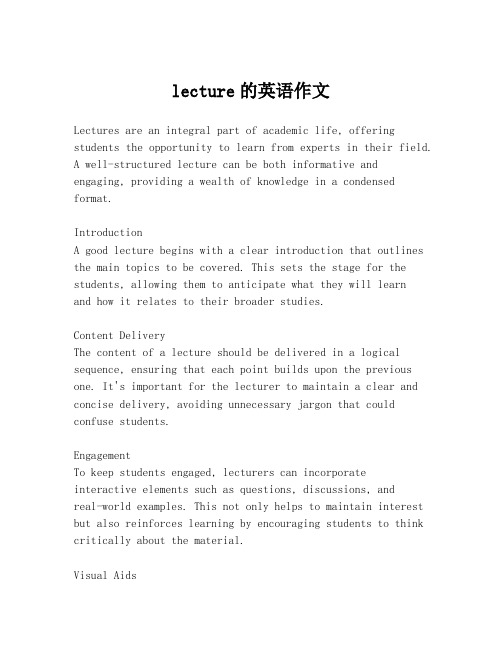
lecture的英语作文Lectures are an integral part of academic life, offering students the opportunity to learn from experts in their field.A well-structured lecture can be both informative and engaging, providing a wealth of knowledge in a condensed format.IntroductionA good lecture begins with a clear introduction that outlines the main topics to be covered. This sets the stage for the students, allowing them to anticipate what they will learnand how it relates to their broader studies.Content DeliveryThe content of a lecture should be delivered in a logical sequence, ensuring that each point builds upon the previous one. It's important for the lecturer to maintain a clear and concise delivery, avoiding unnecessary jargon that could confuse students.EngagementTo keep students engaged, lecturers can incorporateinteractive elements such as questions, discussions, andreal-world examples. This not only helps to maintain interest but also reinforces learning by encouraging students to think critically about the material.Visual AidsVisual aids like slides, diagrams, and videos can greatly enhance a lecture. They provide a visual representation of complex ideas and can help to clarify concepts that might be difficult to understand through spoken words alone.ConclusionA strong conclusion wraps up the lecture by summarizing the key points and highlighting their significance. This helps students to consolidate their learning and understand the broader implications of the topics discussed.Follow-upAfter the lecture, it's beneficial for students to have access to supplementary materials, such as lecture notes or further reading. This allows them to review the material and deepen their understanding.Personal ReflectionReflecting on a lecture can help students to process the information and apply it to their own learning. Encouraging students to write reflections or discuss the lecture with peers can enhance their comprehension and retention of the material.In conclusion, a successful lecture is one that is well-prepared, engaging, and informative. It should challenge students to think critically and provide them with the tools they need to succeed in their academic pursuits.。
Unit_5_key_points
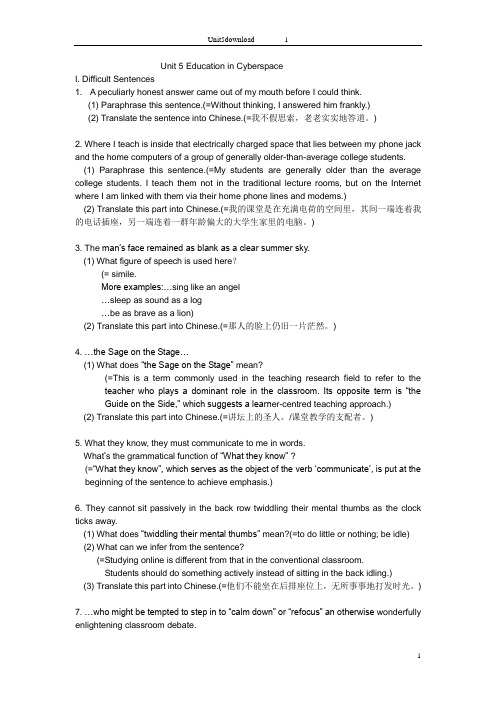
Unit 5 Education in CyberspaceI. Difficult Sentences1. A peculiarly honest answer came out of my mouth before I could think.(1) Paraphrase this sentence.(=Without thinking, I answered him frankly.)(2) Translate the sentence into Chinese.(=我不假思索,老老实实地答道。
)2. Where I teach is inside that electrically charged space that lies between my phone jack and the home computers of a group of generally older-than-average college students. (1) Paraphrase this sentence.(=My students are generally older than the average college students. I teach them not in the traditional lecture rooms, but on the Internet where I am linked with them via their home phone lines and modems.)(2) Translate this part into Chinese.(=我的课堂是在充满电荷的空间里,其间一端连着我的电话插座,另一端连着一群年龄偏大的大学生家里的电脑。
)3. The man‟s face remained as blank as a clear summer sky.(1) What figure of speech is used here?(= simile.More examples:…sing like an angel…sleep as sound as a log…be as brave as a lion)(2) Translate this part into Chinese.(=那人的脸上仍旧一片茫然。
英语作文讲座过程记录
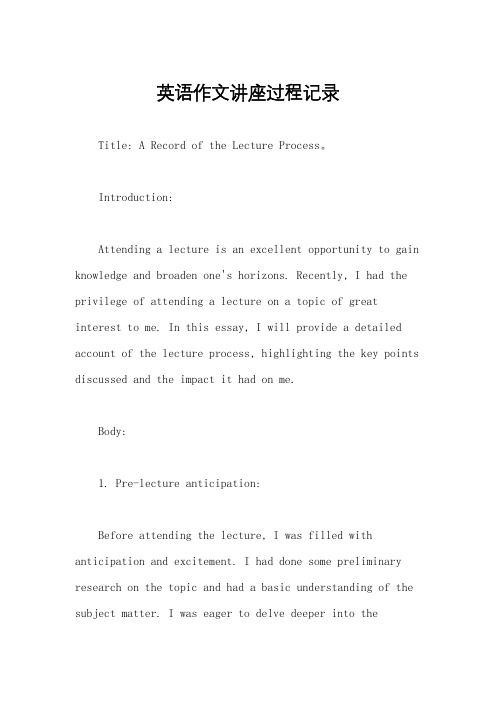
英语作文讲座过程记录Title: A Record of the Lecture Process。
Introduction:Attending a lecture is an excellent opportunity to gain knowledge and broaden one's horizons. Recently, I had the privilege of attending a lecture on a topic of great interest to me. In this essay, I will provide a detailed account of the lecture process, highlighting the key points discussed and the impact it had on me.Body:1. Pre-lecture anticipation:Before attending the lecture, I was filled with anticipation and excitement. I had done some preliminary research on the topic and had a basic understanding of the subject matter. I was eager to delve deeper into thesubject and learn from the expert speaker.2. Arrival and registration:Upon arriving at the lecture venue, I joined a long queue of enthusiastic attendees. The registration process was well-organized, and I received a name tag and a booklet containing information related to the lecture. The atmosphere was charged with anticipation as everyoneeagerly awaited the beginning of the lecture.3. Introduction and speaker's credentials:The lecture commenced with a brief introduction by the host, who highlighted the speaker's impressive credentials and expertise in the field. This further piqued my interest and raised my expectations for the lecture.4. Speaker's presentation:The speaker began by providing an overview of the topic, setting the stage for the rest of the lecture. Thepresentation was well-structured and accompanied byvisually appealing slides. The speaker's delivery was engaging and captivating, effortlessly holding the audience's attention.5. In-depth analysis:As the lecture progressed, the speaker delved into the intricacies of the topic, providing in-depth analysis and insights. The information presented was supported by relevant data, case studies, and real-life examples, making it easier for the audience to comprehend complex concepts. The speaker's expertise and passion for the subject were evident, making the lecture both informative and inspiring.6. Interactive session:To promote active participation, the speaker encouraged the audience to ask questions and share their thoughts. This interactive session allowed for a deeper understanding of the topic as various perspectives were discussed. The speaker skillfully addressed each question, furtherenhancing the learning experience.7. Networking opportunities:During the break, attendees had the opportunity to network with like-minded individuals who shared a common interest in the subject matter. Engaging in conversations with fellow attendees enriched my understanding and provided valuable insights from different viewpoints.8. Conclusion and takeaways:As the lecture drew to a close, the speaker summarized the key points discussed and emphasized their practical applications. The lecture had broadened my understanding of the topic and had sparked a desire to explore it further. I left the venue with a sense of fulfillment and a list of recommended readings and resources provided by the speaker.Conclusion:Attending the lecture was a rewarding experience thatexceeded my expectations. The well-structured presentation, interactive session, and networking opportunities contributed to a comprehensive learning experience. The knowledge gained from the lecture will undoubtedly have a lasting impact on my personal and professional growth. I am grateful for the opportunity to have attended such an insightful lecture and look forward to applying the knowledge gained in my future endeavors.。
学术英语(理工)Unit5
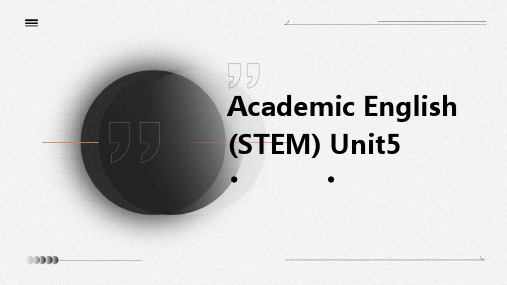
Learning Method
01
Inquiry-based learning
Students will engage in hands-on activities and experiments to
explore the topic and develop their understanding.
Grammar and Sentence Patterns
非谓语动词用法多
非谓语动词在本单元中频繁出现,包括不定式、现在分词 和过去分词等。学生需要了解这些非谓语动词的用法和区 别,以便在写作中更加灵活地运用。
Reading and Writing
阅读材料难度大 写作要求高
本单元的阅读材料涉及大量专业知识和理论,语 言难度较高。学生需要具备较好的阅读能力和技 巧,如快速阅读、归纳总结等,才能有效理解文 章内容。
Vocabulary and expression
抽象概念多
本单元涉及许多抽象的概念和理论,如量子力学、电路分析等。学生需要具备较好的逻辑思维和推理能力,才能理解这些概 念和理论的含义。
Vocabulary and expression
表达方式多样
为了更好地理解和应用科学和工程知识,学生需要掌握多种表达方式,如公式、图表、示意图等。此 外,学生还需要了解如何将这些表达方式与英语语言结合起来,以清晰地传达信息。
Students will work in groups to complete projects and tasks,
enhancing their teamwork and协作精神.
Learning Resources
01
Textbooks
The official textbook for this unit is "Science and Technology in Society: An Introduction to the Principles and Applications".
新视角研究生英语读说写2课后答案
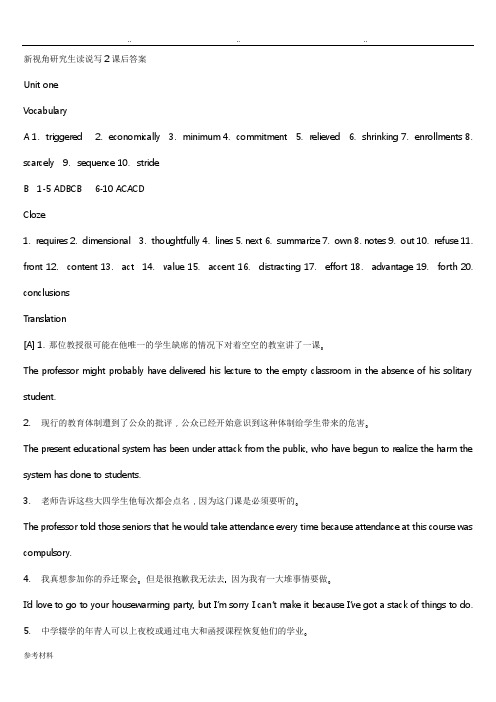
新视角研究生读说写2课后答案Unit oneVocabularyA 1.triggered 2.economically 3.minimum mitment 5.relieved 6.shrinking 7.enrollments 8. scarcely 9.sequence 10.strideB 1-5 ADBCB 6-10 ACACDCloze1.requires2.dimensional3.thoughtfully4.lines5. next6.summarize7.own8. notes9.out 10.refuse 11. front 12.content 13.act 14.value 15.accent 16.distracting 17.effort 18.advantage 19.forth 20. conclusionsTranslation[A] 1. 那位教授很可能在他唯一的学生缺席的情况下对着空空的教室讲了一课。
The professor might probably have delivered his lecture to the empty classroom in the absence of his solitary student.2. 现行的教育体制遭到了公众的批评,公众已经开始意识到这种体制给学生带来的危害。
The present educational system has been under attack from the public, who have begun to realize the harm the system has done to students.3. 老师告诉这些大四学生他每次都会点名,因为这门课是必须要听的。
The professor told those seniors that he would take attendance every time because attendance at this course was compulsory.4. 我真想参加你的乔迁聚会。
The key points

The key points: to listen ,say and act out the playThe difficult point: the moral meanings of the playTeaching Procedures:Step I Lead- in1. T:Do you like watching plays ? Ss:.....2. T:Which play do you like best ? Why ? Ss: .....Step II. Today, you will have a chance to experience plays. OK . Let’s move to the project section. In this section, you’ll read the first short plays and perform. In order to finish the project, you are expected to learn how to cooperate as a team and how to fulfill each part of the work.T: OK. Let’s come to the first play: The invisible benchListen to the tape, and then answer the question:1. What are the basic elements of the play ?Theme (topic/ title)play CharactersSetting (background)Plot (what happened)Theme: the invisible benchCharacters: five studentsSetting: in a parkPlot (what happened): They sit on an invisible bench one after another2. Scan the play and answer the questions below(1). Is there a bench in the courtyard?No, there isn't.(2). What does the word "invisible" mean?看不见的;无形的(3). What kind of play is it? Comedy or tragedy?It is a comedy.(4).Why do they still sit on this invisible bench one after another? (依次地)They dare not tell the truth____and just__follow in___others' footsteps.Step III Discussion:Divide the students in two. Discuss the questions:1. What kind of comedy does this play use?It is in the physical style of comedy. Actors use body language to perform the play.2. What do you think the playwright wants to tell us?The Students’ answersT: The playwright tells us a phenomenon in our society.1)A small group of people around us are hypocritical and proud of themselves. They save their faces at all costs, but actually they will suffer from their own actions.2)A person’s actions sometimes are controlled by the mental consciousness (意识).Sometimes your actions are dominated (支配) by others.3)The playwright writes the play in an ironic way. This kind of play always leads us to thinking, because they always reflect some social problems around us.Step Ⅳ. How can we act out a play well ?EmotionsActionsFacial ExpressionsProps (道具)Enjoy a videoStepⅤ . Act out the playStep Ⅵ. Practise(ask for some groups and act out another play) Step Ⅶ. Homework:1.Read the play with emotions after class2.Write down some important phrases of the play。
presentation_Using Visual Aids

e visual aids effectively
Can this graph convey information effectively?
Tips: A pie graph should have no more than eight segments!
ZUEL
e visual aids effectively
ZUEL
e visual aids effectively When preparing visual aids, we should… 1.keep them simple.
2. make sure that they can be seen clearly
----make them large enough. ----use fonts that are easy to read (c.f. page 335). ----use color effectively. 3. choose the appropriate type.
Preparing visual aids
Presenting visual aids
ZUEL
e visual aids effectively
When presenting visual aids, we should… 1. display visual aids only while discussing them. 2. talk to you audience, not to your visual aids. 3. explain visual aids clearly and concisely. 4. practice with your visual aids.
教授讲座的英语作文模板

教授讲座的英语作文模板Title: English Essay Template for Lecturing。
Introduction:Lecturing is an essential part of academic life, and delivering a successful lecture in English requires a structured and well-organized approach. This essay template aims to provide a comprehensive guide for professors and educators to create effective and engaging lectures in English.Opening:To begin with, it is crucial to have a clear understanding of the topic and the audience. The lecture should be tailored to the level of the audience, whether it is undergraduate students, graduate students, or professionals. Understanding the audience's level of knowledge and their interests will help in creating a lecture that is engaging and informative.Main Body:1. Structure of the Lecture。
Start with an attention-grabbing introduction to set the tone for the lecture.Clearly outline the objectives and key points that will be covered in the lecture.Organize the content into logical sections with clear transitions between topics.Use visual aids such as slides, diagrams, and videos to enhance understanding and engagement.2. Language and Clarity。
英语notetaking范文
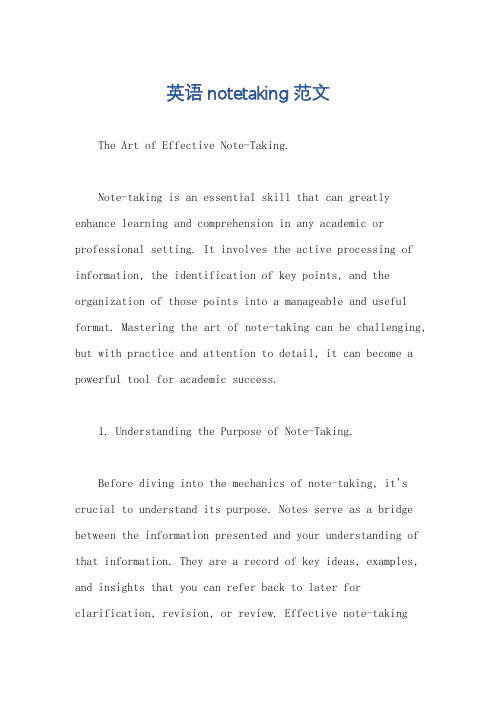
英语notetaking范文The Art of Effective Note-Taking.Note-taking is an essential skill that can greatly enhance learning and comprehension in any academic or professional setting. It involves the active processing of information, the identification of key points, and the organization of those points into a manageable and useful format. Mastering the art of note-taking can be challenging, but with practice and attention to detail, it can become a powerful tool for academic success.1. Understanding the Purpose of Note-Taking.Before diving into the mechanics of note-taking, it's crucial to understand its purpose. Notes serve as a bridge between the information presented and your understanding of that information. They are a record of key ideas, examples, and insights that you can refer back to later for clarification, revision, or review. Effective note-takinghelps you focus on what's important, organize your thoughts, and connect new information to existing knowledge.2. Listening Actively.Good note-taking begins with active listening. This means paying close attention to the speaker or presenter, understanding the main points, and anticipating where the conversation or lecture might lead. Listen for transitions, such as "next," "finally," or "in conclusion," which often signal a change in topic or the conclusion of a point.3. Outlining the Structure.Before taking notes, it's helpful to have a basicoutline or framework in mind. This could be a simple listof headings or a more detailed outline that reflects the structure of the talk or lecture. Having a clear structure will help you organize your notes and make them easier to follow later.4. Capturing Key Points.As the information is presented, it's important to identify and record the key points. These are the ideas, facts, or examples that are central to the talk or lecture. Avoid transcribing every word verbatim; instead, focus on capturing the essence of what is being said. Use abbreviations, shorthand, or symbols to speed up the note-taking process.5. Using Your Own Words.Paraphrasing and summarizing information in your own words is a crucial step in effective note-taking. This not only helps you process and understand the informationbetter but also ensures that your notes are unique and tailored to your own understanding. Avoid copying directly from slides or textbooks; instead, use these resources as a reference to supplement your notes.6. Linking Ideas.Good notes should not only record facts but also showhow those facts are connected. Use arrows, underlining, or other visual cues to indicate relationships between ideas. This will help you see patterns and connections that might not be immediately apparent during the talk or lecture.7. Reviewing and Updating Your Notes.After taking notes, it's essential to review them and make any necessary corrections or clarifications. This step is often overlooked but is crucial for ensuring the accuracy and usefulness of your notes. As you review, consider adding additional insights, examples, or questions that emerged after further reflection on the material.8. Practicing and Perfecting Your Technique.Like any skill, note-taking requires practice and refinement. Start by taking notes in a variety of settings, such as classrooms, meetings, or workshops. Experiment with different note-taking methods and find one that works best for you. Over time, you'll develop a system that is both efficient and effective.In conclusion, effective note-taking is a valuableskill that can enhance your learning and comprehension in any academic or professional setting. By understanding its purpose, actively listening, outlining the structure, capturing key points, using your own words, linking ideas, and reviewing and updating your notes, you can develop a system that works for you and becomes a powerful tool for academic success. With practice and attention to detail, you'll find that note-taking becomes less of a chore and more of a natural extension of your learning process.。
新视角研究生英语读说写2课文原文加翻译及课后答案
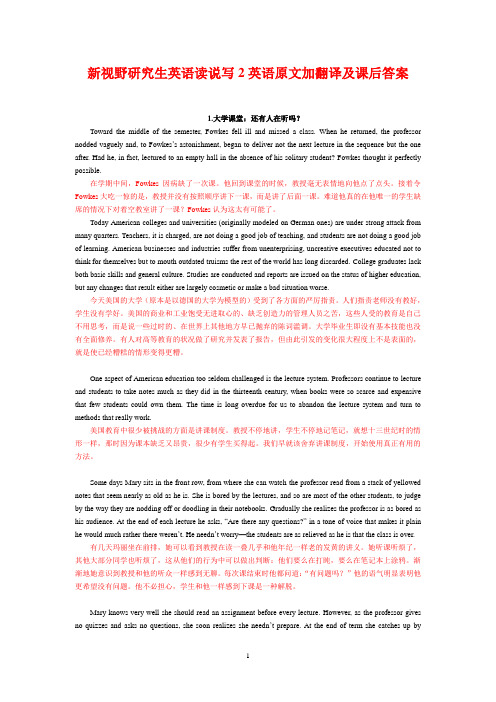
新视野研究生英语读说写2英语原文加翻译及课后答案1.大学课堂:还有人在听吗?Toward the middle of the semester, Fowkes fell ill and missed a class. When he returned, the professor nodded vaguely and, to Fowkes’s astonishment, began to deliver not the next lecture in the sequence but the one after. Had he, in fact, lectured to an empty hall in the absence of his solitary student? Fowkes thought it perfectly possible.在学期中间,Fowkes 因病缺了一次课。
他回到课堂的时候,教授毫无表情地向他点了点头。
接着令Fowkes大吃一惊的是,教授并没有按照顺序讲下一课,而是讲了后面一课。
难道他真的在他唯一的学生缺席的情况下对着空教室讲了一课?Fowkes认为这太有可能了。
Today American colleges and universities (originally modeled on German ones) are under strong attack from many quarters. Teachers, it is charged, are not doing a good job of teaching, and students are not doing a good job of learning. American businesses and industries suffer from unenterprising, uncreative executives educated not to think for themselves but to mouth outdated truisms the rest of the world has long discarded. College graduates lack both basic skills and general culture. Studies are conducted and reports are issued on the status of higher education, but any changes that result either are largely cosmetic or make a bad situation worse.今天美国的大学(原本是以德国的大学为模型的)受到了各方面的严厉指责。
《学术英语阅读》答案
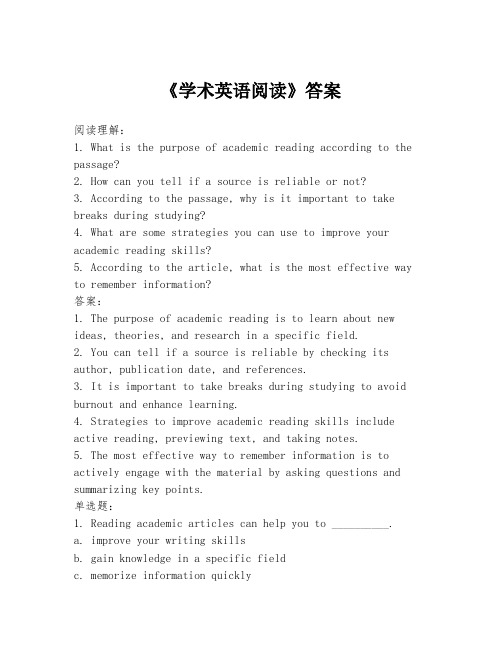
《学术英语阅读》答案阅读理解:1. What is the purpose of academic reading according to the passage?2. How can you tell if a source is reliable or not?3. According to the passage, why is it important to take breaks during studying?4. What are some strategies you can use to improve your academic reading skills?5. According to the article, what is the most effective way to remember information?答案:1. The purpose of academic reading is to learn about new ideas, theories, and research in a specific field.2. You can tell if a source is reliable by checking its author, publication date, and references.3. It is important to take breaks during studying to avoid burnout and enhance learning.4. Strategies to improve academic reading skills include active reading, previewing text, and taking notes.5. The most effective way to remember information is to actively engage with the material by asking questions and summarizing key points.单选题:1. Reading academic articles can help you to __________.a. improve your writing skillsb. gain knowledge in a specific fieldc. memorize information quickly2. Which of the following is NOT a reliable source for academic research?a. An article published in a reputable academic journalb. A personal blog written by someone with expertise in a specific fieldc. A book written by a well-known scholar3. According to the passage, what is an effective way to reduce distractibility while studying?a. Listening to musicb. Turning off your phonec. Drinking coffee4. Which of the following is an example of active reading?a. Skimming a text quicklyb. Highlighting important informationc. Reading while watching TV5. Previewing a text before reading involves __________.a. reading the entire text from start to finishb. looking for key words and phrasesc. summarizing the main points答案:1. B2. B3. B4. B5. B完形填空:When it comes to academic reading, there are many __1__ you can use to improve your skills. One of the most effective strategies is active reading, which __2__ engaging with the text by asking questions, summarizing key points, and making connections to your own experiences. __3__, previewing a textbefore reading can help you to gain an __4__ of what it is about, which can make the actual reading process easier. Another strategy for improving your academic reading skillsis to take __5__ while you read. This can involve underlining important information, making notes in the margins, or __6__ a summary of the key points after each section. If you __7__ new vocabulary or concepts, it may be helpful to look them up __8__ and make note of their definitions.Finally, it is important to __9__ breaks while studying to avoid burnout and enhance learning. Research has shown that taking short breaks every hour or so can __10__ your productivity and focus.1. a. strategies2. b. involves3. c. Additionally4. a. understanding5. d. notes6. b. writing7. c. encounter8. b. immediately9. d. take10. a. increase答案:1. A2. B3. C4. A5. D6. B7. C8. B9. D10. A听力理解:1. What is the topic of the lecture?2. According to the professor, what are some effective strategies for improving academic reading skills?3. According to the speaker, what are some characteristics ofa reliable source for academic research?4. What does the professor recommend for reducing distractibility while studying?5. What is the main conclusion of the lecture?答案:1. Strategies for improving academic reading skills.2. Active reading, previewing text, and taking notes.3. A reliable source for academic research should be written by experts in the field and be recent and reputable.4. Turning off your phone or finding a quiet place to study can reduce distractibility.5. The main conclusion of the lecture is that by applying different strategies for academic reading, students will be able to improve their ability to gain knowledge in a specific field.作文:请写一篇作文,提供至少三种你所使用的有效的英语阅读策略,并举例说明如何使用他们来改善你的阅读技能。
教学重点用英语怎么说

教学重点用英语怎么说教学重点是依据教学目标,在对教材进行科学分析的基础上而确定的最基本、最核心的教学内容,一般是一门学科所阐述的最重要的原理、规律,是学科思想或学科特色的集中体现。
目标它的突破是一节课必须要达到的目标,也是教学设计的重要内容。
那么你知道教学重点用英语怎么说吗?下面来学习一下吧。
教学重点的英语说法1:key teaching points教学重点的英语说法2:Teaching Key Points教学重点的相关短语:教学重点及难点 Teaching important points课单元教学重点 Main Points of Teaching教学重点与难点 Teaching difficult and important points教学重点的英语例句:1. It can enrich the teaching out spike skill practice step by step.挥臂击球是扣球技术教学重点,助跑起跳是扣球技术教学难点.2. Adverse drug reaction ( ADR ) is one of the important contents in the teaching of Hospital Pharmacy.药物不良反应是医院药学工作的研究重点内容之一,也是《医院药学》课的教学重点之一.3. So, language teaching in this country is converging with Canada in focusing on all four skills.所以, 中国已与加拿大一样,把语言教学重点放在了读、写、听、说四种技能的训练之上.4. Teaching Important Points : The essence of subtraction and the relationship between the parts of subtraction.教学重点: 减法的意义和加减法的各部分的关系.5. The emphasis throughout is on learning rather than teaching in class.贯穿始终的重点是课堂上的学习,而不是教学.6. This thesis reports a case of using blogs in curriculum and instruction.本文重点探讨了博客应用于课程教学的情况.7. This course features in - depth study questions associated with lecture content and readings.课程重点本课程以结合教学内容、课文阅读与极具深度的研究习题为特色.8. The stress of teaching lies in pertinence, flexibleness, for manipulation and utility.教学方法重点体现针对性,灵活性, 可操作性和使用性.9. Recursive algorithms in a data structures course are both important and difficult.数据结构课程中的递归算法的教学既是重点又是难点.10. Therefore the teaching of spoken English is the key and point in the tourism English classes.因此,英语口语教学既是旅游英语课堂教学的重点,又是旅游英语课堂教学的难点.11. The theory on disturbance of acid - alkaline balance is difficult to be taught and understood.酸碱平衡紊乱是病理生理学理论教学中的重点和难点.12. The method innovated and learning process have always been the theoretical focus the teaching effect.方法创新和学习过程在教学中的作用和效果一直是教学理论研究的重点.13. This article carries on the key discussion current event hot spot inducts the teaching.本文将重点讨论时事热点进行导入教学.14. According to the calculation of chemical formula is a key junior high school chemistry teaching content.根据化学方程式的计算是初中化学教学中一个重点内容.15. There is no need to burden students terminology for learning cohesion terms in linguistics.在阅读教学中教授衔接,重点应放在衔接的应用上,而不是衔接的知识上.。
Unit 5銆奙usic銆婰istening,Speaking and Writing鏁

Unit 5 MusicListening, Speaking and WritingAimsTo read the story about Freddy and then enjoy and understand Beatles’ songs.To use the language by reading, listening, speaking and writing.ProceduresI. Warming up by listening and writingTurn to page 37 and read these sentences before listening to the tape. Then listen to the tape and decide true or false.II. Guided reading1.Reading and translatingRead more about Freddy’s life and translate it into Chinese paragraph by paragraph.2.Reading and underlining3.Doing exercisesNow you are going to do exercises No. 3, 4 and 5 on page 38 following the article. Ex3: Here are the incorrect sentences which should be crossed out.1.Freddy and his band always loved being pop stars.2.His favorite program was “Top of the Pops”.3.Things went wrong because Freddy and his band hid themselves.4.They realized they had to go because they were painful.Exercise 4 Answer these questions:1.This is an open question by which students are asked about their opinions.Answers may vary.2.Answers may vary but there is information in the reading passage that may include: --- becoming rich;--- doing a job you want to do;--- having many fans;--- people enjoying your music.3.Answers may vary but information may include:--- peaceful and quiet;--- a private life away from crowds;--- a personal life which others do not discuss.Exercise 5: The main idea is No. 3. This is a story about a band that became famous and did not like it. Only No. 3 best summarizes the main idea, while all the others reflect just part of the main idea. At first, Freddy and his band wanted to be famous, but when he became famous, they were always being followed wherever they went, which they found painful.III. Guided writing1.Writing a letter for advicePlease turn to page 38 writing. Let’s read the instructions.You’d better do some brainstorming in small groups before writing your letters. Youshould follow the procedure for brainstorming and outlining introduced in Module 1 Unit 2.2.Reading Freddy’s replyLet’s read Freddy’s reply and answer the questions:--- How was Freddy’s band formed?--- What advice does Freddy give?3.Writing a note and a paragraphPlease turn to page 74. Now in pairs you are going to decide on the best way to tell a foreign friend about one kind of Chinese folk music. What do you think they need to know before they can enjoy it? Why do you like it? Who are your favorite singers? Discuss it with your partner and write notes to remind you of your most important ideas. Then write a paragraph telling your foreign friend about the type of Chinese folk music you have chosen. Use a dictionary and other reference books to help you. IV. Further applyingFinding informationGo to the library to read or get online to search in order to find more informationon music and musicians. Take notes of your findings and report them to your group mates next Monday morning.V. Closing down by filling a formMake use of the text and others to fill in the form below.Closing down by describing a bandTo end this period, I am going to have two of you to describe to the class a band whom you appreciates. Who’d like to speak first?。
2020--2021学年人教版必修二Unit 5 Music language points学案

Unit 5 Music language points学案一.请根据中文意思完成下列句子1.I met an old friend in the street _____ __________.我偶然在街上遇见一位老朋友。
2.Once you make up your mind, you should _______ ____ it.你一旦下了决心,你应该坚持下去。
3.I ______ _____ being a great scientist when I was a child.当我是个小孩的时候我梦想成为一名伟大的科学家。
4. I spent a whole morning to _____ _____ my books.我花了整整一个上午把我的书归类好。
5. It is impolite to _______ ______ _____ others.开别人的玩笑是不礼貌的。
6.He will arrive at six o’clock _____ ____.他大约六点到。
7.______ ____, you should make a plan for your study.首先你应该为你学习制订好计划。
8.We should _____ ______ _____ our parents.我们应该对我们的父母诚实。
9. The club ____ ____ last year.那个俱乐部去年解散了。
二.请根据首字母完成下列句子1.Many people don’t like a________.2. His book was quite a h___ in London.3. Do you know how did it f_______?4. Guilin is an a_________ city.5. We enjoyed the p_____________ last night.6. How much did you e____ last month.7. We need an e_____ day to do the job.8. Liu Dehua is a well__ known a______.9. He has the a______ to speak four languages.10. The little town is u_________ to us.11. Two p____________ vitnessed the accident.12. His father a famous m________.13. They are the f____ of Zhou Bichang.参考答案:一.1. by chance 2. stick to 3. dreamt of 4. sort out 5. play jokes on6. or so7. Above all8. be honest with9. broke up二.1. advertisements 2. hit 3. form 4. attractive 5. performance 6. earn7. extra 8. actor 9. ability 10. unknown 11. passers-by 12. musician13. fansword usage1.form 1) n. the pattern or nature of anything; sth. that gives the shape (to sth.)2) v. give shape to; develop by instruction; to construct, make or produceChurches are often built in the form of a cross.To apply for a job, you must fill out a form.The design is formed with trianglesHe forms the habit of getting up early.We formed a club.2. attractive adj. able to attract; exciting interest or pleasure; good lookingThe girl has attractive eyes.The picture drawn by Xu Beihong is very attractive to the visitors.3. perform v. to do or carry out; to act in a play; to play music before publicThe young doctor performed the heart operation.The students will perform an opera next Friday.The soloist had never performed in London before.Our team performed well in the match yesterday.4. ability n. skill; capability or power to do sth.She did the work to the best of her ability.He is a man of great ability.The acting abilities of both are well-known.5. advertisement n. public note (esp. in newspaper or TV) to arouse the public’s attentionabout a product or ideaAdvertisement helps to sell goods.You can always see a lot of advertisements in the newspaper.Your job is dealing with advertisements.6. musician n. someone who is talented at composing or performing musicHe wants to be a great musician in the future.Her mother’s friend, Miss Chen, is a well- known musician.It seems that musicians always keep long hair.7. reputation n. great opinion about a person’s character; state of being respectedThe store has an excellent reputation for fair dealing.This restaurant has a fine reputation.Cheating in the game ruined that player's reputation.8. sort 1) n. kind; person or specified personality2) v. arrange according to different categories such as class, kind or sizeAll sorts of lamps are available in that shop.That's just the sort of thing I want.They sort apples by size.Can't you sort the good from the bad?9. clap 1) n. the action or sound of hands-clapping; a high-pitch noise of thunder2) v. to strike together with handsThey gave the speaker a clap.A clap of thunder reverberated through the house.The audience clapped the pianist heartily.10. roll 1) n. sth rolled up, such as paper; things with this shape; list of names2) v. to move by turning over and over; to form into cylindrical or spherical shape; (ofearth) to extend as in a wave; (to cause to) sound with long, vibrating tone; to swayPlease buy a roll of film for me.The roll of thunder was deafening.She rolled up her sleeves and began to prepare for supper.The truck rolled on at full speed.The coin rolled under the bed.The boat rolled badly.11. sayinga well-known wise statement“There is no smoke without fire”, as the saying goes.Read some of the following sayings, then write your own famous quote about music and what it means to you.Useful expressionsdream of \ about (doing) sthimagine sth would come trueHave you ever dreamt of being in front of thousands of people at a concert, with everyone clapping and enjoying your singing?He dreams of becoming a sailor.He got the first place this time, but he never dreamt about that.1.b e honest withtell what exactly what one thinksto be frank withIf we are honest with ourselves, most of us have dreamed of being famous.I shall be quite honest with you.If you are honest with others, they will help you a lot.2.p lay a joke on \ with sb = play jokes on \ with sbThe musician of whom the bank was formed played jokes on each other as well as played music.They were playing jokes on each other while drinking.Take it easy, he is only playing a joke with you.3.o r soIt'll only cost 15 dollars or so.There were twenty or so.Our manager will be back in a month or so.4.b reak upgo away in different directionsHowever, the bank broke up in about 1970, but reunited in the mid-1980s.The police tried to break up the crowd.The two friends broke up.Nearly three hours later, the meeting finally broke up.5.b y chanceby accidentI met my classmate in the street by chance.He got the money in the room by chance.I found my lost watch by chance yesterday.6.s ort outto separate from a mass or group; to put things in order; place according to kind, rank, etc.; arrangePlease sort out the papers to be throw away, and put the rest backShe got a job sorting out letters in the Post Office.Some of the massages are getting mixed up. Can you sort them out?7.stick toYou should stick to your dream.Stick to the task until it is finished.Make a special time for practicing and stick to it.He never sticks to anything for long.8.a bove allmost important of allAnd above all, remember to send us your commentsAbove all, you should be honest with me right now.。
大学英语2-复习参考资料_keypointsunit4
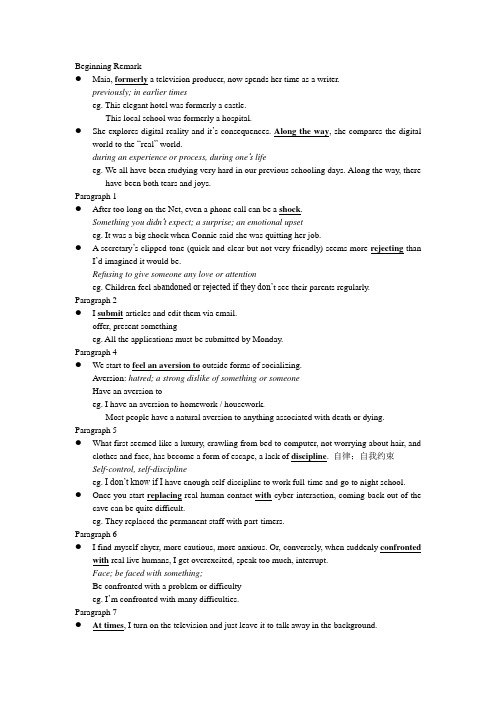
Beginning Remark●Maia, formerly a television producer, now spends her time as a writer.previously; in earlier timeseg. This elegant hotel was formerly a castle.This local school was formerly a hospital.●She explores digital reality and it’s consequences. Along the way, she compares the digitalworld to the “real” world.during an experience or process, during one’s lifeeg. We all have been studying very hard in our previous schooling days. Along the way, there have been both tears and joys.Paragraph 1●After too long on the Net, even a phone call can be a shock.Something you didn’t expect; a surprise; an emotional upseteg. It was a big shock when Connie said she was quitting her job.● A secretary’s clipped tone (quick and clear but not very friendly) seems more rejecting thanI’d imagined it would be.Refusing to give someone any love or attentioneg. Children feel ab andoned or rejected if they don’t see their parents regularly.Paragraph 2●I submit articles and edit them via email.offer, present somethingeg. All the applications must be submitted by Monday.Paragraph 4●We start to feel an aversion to outside forms of socializing.Aversion: hatred; a strong dislike of something or someoneHave an aversion toeg. I have an aversion to homework / housework.Most people have a natural aversion to anything associated with death or dying. Paragraph 5●What first seemed like a luxury, crawling from bed to computer, not worrying about hair, andclothes and face, has become a form of escape, a lack of discipline. 自律;自我约束Self-control, self-disciplineeg. I don’t know if I have enough self-discipline to work full-time and go to night school.●Once you start replacing real human contact with cyber-interaction, coming back out of thecave can be quite difficult.eg. They replaced the permanent staff with part-timers.Paragraph 6●I find myself shyer, more cautious, more anxious. Or, conversely, when suddenly confrontedwith real live humans, I get overexcited, speak too much, interrupt.Face; be faced with something;Be confronted with a problem or difficultyeg. I’m confronted with many difficulties.Paragraph 7●At times, I turn on the television and just leave it to talk away in the background.sometimeseg. Life is hard at times.●The voices of the programs are comforting, but then I’m jarred by the commercials.to make someone feel annoyed or shockedjar oneg. The screaming was starting to jar on my nerves.Their laughter jarred and confused me.●I find myself sucked in by soap operas, or needing to keep up with the latest news and theweather.to continue to read and learn about a particular subject, so that you always know about the most recent facts, products etc.eg. keep up with the latest technical developments / fashion / what is going on / life●They are of no possible use to me.The are useless to me.It is very important. = It is of great importance.Paragraph 8●I find myself attacking everyone in sight.inside the area that you can seeeg. I glanced around me quickly. There was no one in sight.I went home and ate everything in sight.Since my dormitory was in sight, I told him he could go.Peace is now in sight.Out of sighteg. He waved until she was out of sight.Out of sight, out of mind.●I’m bad-tempered, and easily angered.ill-tempered; quick-tempered; irritableeven-tempered (calm and does not easily become angry)good-tempered (pleasant, kind, and not easily made angry)hot-tempered (having a tendency to become angry easily)short-tempered (tending to become angry very quickly) (气来得很快)She gets short-tempered when she’s tired.sweet-tempered (having a character that is kind and gentle)●I find everyone on my mailing list insensitive, believing that they’ve forgotten that there arepeople actually reading their wounding remarks.Insensitive: unfeeling, uncaring, inconsiderateeg. She is totally insensitive to Jack’s feelings.Wounding remarks: hurting words, upsetting commentseg. He made some very wounding remarks.●I don’t realize that I’m projecting until after I’ve been embarrassed by someone who politelypoints out that I’ve attacked her for agreeing with me.to imagine that someone else is feeling the same emotions as youeg. You’re projecting again: I’m not angry with you, it’s you who are angry with me!你又疑心生暗鬼了,我没生你的气,是你在生我的气。
学术英语理工(第二版)Unit5课文翻译
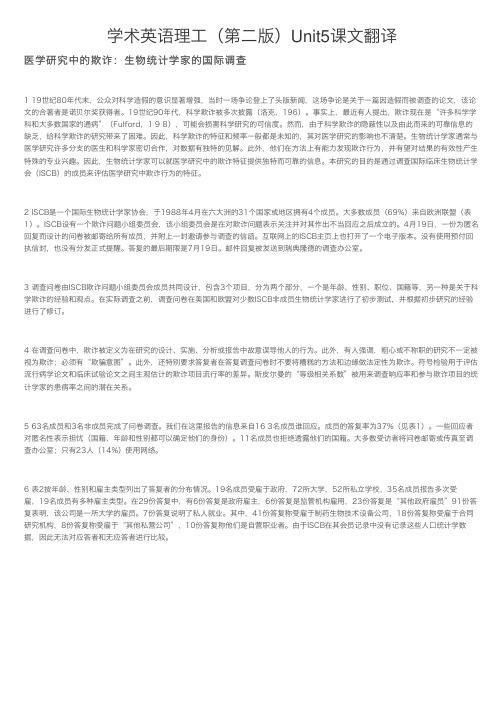
学术英语理⼯(第⼆版)Unit5课⽂翻译医学研究中的欺诈:⽣物统计学家的国际调查1 19世纪80年代末,公众对科学造假的意识显著增强,当时⼀场争论登上了头版新闻,这场争论是关于⼀篇因造假⽽被调查的论⽂,该论⽂的合著者是诺贝尔奖获得者。
19世纪90年代,科学欺诈被多次披露(洛克,196)。
事实上,最近有⼈提出,欺诈现在是“许多科学学科和⼤多数国家的通病”(Fulford,1 9 8),可能会损害科学研究的可信度。
然⽽,由于科学欺诈的隐蔽性以及由此⽽来的可靠信息的缺乏,给科学欺诈的研究带来了困难。
因此,科学欺诈的特征和频率⼀般都是未知的,其对医学研究的影响也不清楚。
⽣物统计学家通常与医学研究许多分⽀的医⽣和科学家密切合作,对数据有独特的见解。
此外,他们在⽅法上有能⼒发现欺诈⾏为,并有望对结果的有效性产⽣特殊的专业兴趣。
因此,⽣物统计学家可以就医学研究中的欺诈特征提供独特⽽可靠的信息。
本研究的⽬的是通过调查国际临床⽣物统计学会(ISCB)的成员来评估医学研究中欺诈⾏为的特征。
2 ISCB是⼀个国际⽣物统计学家协会,于1988年4⽉在六⼤洲的31个国家或地区拥有4个成员。
⼤多数成员(69%)来⾃欧洲联盟(表1)。
ISCB设有⼀个欺诈问题⼩组委员会,该⼩组委员会是在对欺诈问题表⽰关注并对其作出不当回应之后成⽴的。
4⽉19⽇,⼀份为匿名回复⽽设计的问卷被邮寄给所有成员,并附上⼀封邀请参与调查的信函。
互联⽹上的ISCB主页上也打开了⼀个电⼦版本。
没有使⽤预付回执信封,也没有分发正式提醒。
答复的最后期限是7⽉19⽇。
邮件回复被发送到瑞典隆德的调查办公室。
3 调查问卷由ISCB欺诈问题⼩组委员会成员共同设计,包含3个项⽬,分为两个部分,⼀个是年龄、性别、职位、国籍等,另⼀种是关于科学欺诈的经验和观点。
在实际调查之前,调查问卷在美国和欧盟对少数ISCB⾮成员⽣物统计学家进⾏了初步测试,并根据初步研究的经验进⾏了修订。
- 1、下载文档前请自行甄别文档内容的完整性,平台不提供额外的编辑、内容补充、找答案等附加服务。
- 2、"仅部分预览"的文档,不可在线预览部分如存在完整性等问题,可反馈申请退款(可完整预览的文档不适用该条件!)。
- 3、如文档侵犯您的权益,请联系客服反馈,我们会尽快为您处理(人工客服工作时间:9:00-18:30)。
Chapter III Word-formation (I)-----The Three Major Processes of Word-formation1. General RemarksV arious ways of forming words can be classified on the basis of frequency of usage, into major or minor processes. The major processes are three, namely, compounding, derivation and conversion. The minor processes are eight, namely, acronymy, blending, clipping, words from proper names, back-formation, reduplication, neo-classical formation and miscellaneous.A. Percentage of new words coined by the different word-formation processes after World War II The percentage of firmly established new words coined by the above processes since World War II is shown in the following:1. The three major processes of word-formation:(a) Compounding or composition (about 27%):raindrop, snow-white, baby-sit;(b) Derivation or affixation (about 17.5 %): Prefixation: deescalate, antihero;Suffixation: hawkish, modernize;(c) Conversion (about 10.5%):bottle (verb), buy (noun).Note that words formed by these processes account for 55% of the new vocabulary.2. The eight minor processes of word-formation:(a) Initialisms and acronyms (about 9%): U. N., TV, UNESCO, NATO;(b) Blending (about 6%): brunch, telex, airtel;(c) Clipping (about 2%): phone, flue, lab;(d) Words from proper names (about 2%): an Uncle Tom, xerox;(e) Back formation (about 1%): gangle, vacuumclean;(f) Reduplication (about 0.5%): walkie-talkie, go-go;(g) Neoclassical formations (about 4%): psychodelic, neurolinguistic;(h) Others (about 3%): pizzazz, gazump.Words formed by these minor processes account for 26.5% of the new vocabulary. The remaining 18.5% is from borrowing, e.g. discotheque, ombudsman and many others.B. Some basic concepts of word-formation1. Word-formation rules: Any rule of word-formation is of limited productivity in the sense that not all the words which result from the application of the rule are acceptable. Thus readable, fashionable are acceptable, but writable, deskable are not acceptable.2. Root, stem, base: The three are terms used in linguistics to designate that part of a word that remains when all affixes have been removed.A root is a form that is not further analysable, either in terms of derivational or inflectional morphology. It is that part of a word-form that remains when all the inflectional and derivational affixes have been removed. Thus in the word undesirables, the root is desire, to which first the suffix –able, then the prefix un- and finally the inflectional suffix –s have been added. In a compound word like greenhouse, there are two roots, green and house.A stem is of concern only when dealing with inflectional morphology. It is the part of word form which remains when all inflectional affixes have been removed. Thus in the word undesirables, the stem is undesirable; but in the word desired, the stem is desire; in the wordgreenhouses the stem is greenhouse, even though the stem consists of two roots.A base is any form to which affixes of any kind can be added; it may also be defined as “a form to which a rule of word-formation is applied.” Therefore, this means that any root or stem can be termed a base. But a base differs from both a root or a stem, because they have their own special features as we have discussed before.2. Compounding2.1.Definition: Compounding or composition is a word-formation process consisting of joining two or more bases to form a new unit, a compound word.Today the largest number of new words are formed by compounding.Compounds are written in various ways, e.g.(a) solid: airtight, airmail;(b) hyphenated: air-conditioning;(c) open: air force, air raid.The general tendency nowadays is for compounds to be written “solid” as soon as they have gained permanent status; otherwise they are written open.2.2. Classification of CompoundsCompound words may be idiomatic or non-idiomatic. A compound word is considered idiomatic when its meaning is not equal to the sum total of the meanings of its components and there is a transfer of meaning. green-room: “a room in a theatre for actors and actresses when they are not on the stage”. A compound is non-idiomatic when the meaning is nothing but the sum total of the meanings of its components, e.g. half-dead, half brother, half sister, half holiday, half- time.Compounds are here classified according to parts of speech of the compounds, i.e. as noun compounds, adjective compounds and verb compounds, which are then subdivided by the syntactic relation of the compounding elements (this relation is indicated by syntactic paraphrase).2.2.1. Noun compounds:2. 2.1.1The principal structural types:(1) Noun + noun: lip service, Line-item-veto, fortune hunter, nest egg, Scapegoat(2) Adjective + noun:green-room, deadline, highway, hardware(3) Verb + noun: cutthroat, pickpocket, driveway, makeshift, glowworm(4) ving + noun: living-room, freezing point, running water, sleeping car, drinking water(5) Pronoun + noun: he-goat, she-devil, she-wolf, self-sacrifice(6) Preposition + noun: aftereffect, underclothes(7) Noun + verb: toothpick, snowfall, daybreak, heartbeat(8) Noun + ving: handwriting, housekeeping, drugdealing(9) Verb +adverb: makeup, breakthrough, handout, startup(10) Adverb + verb: income, upstart, downfall(11) Compounds connected by a preposition or a conjunction:editor-in-chief, good-for-nothing, give-and-take, come-and-go(12) Compounds connected by “s”: herdsman, sportsman, cockscomb(13) Miscellany: forget-me-not, pick-me-up, merry-go-round( 旋转木马)2. 2.1.2 The syntactical relations between the two components of a compound word .(1) Subject and predicate: sunset, crybaby, headache heartbeat(2) Verb and object: sightseeing, handshake, drinking water(3) Subject and object; sugar cane, gas light, oil well, tear gas, power plant(4) Appositive relation: manservant, lady-doctor, girlfriend(5) Coordinate relation: deaf-mute,(6) Predicate and adverbiala. adverbial of place: living room, field workb. adverbial of time: day dreamc. adverbial of manner: chain reaction(7) Part and whole:piano key, bottleneck, arrowhead, doorknob2.2.2 Compound adjectives2.2.2.1The principal structural types of compound adjectives are as follows:(1) Noun + adjective: snow-white, homesick, duty-free(2) Adjective + adjective: bittersweet, dead-alive(3) Noun +present participle: record-breaking, epoch-making(4) Noun + past participle: heart-felt, suntanned(5) Adjective + present participle: easy-going(6) Adjective + past participle: quick-frozen, ready-made(7) Adverb + present participle: ever-lasting, far-reaching, well-meaning(8) Adverb + past participle: well-informed, hard-earned(9) Adjective + noun: full-time, large-scale, red-letter, white-collar(10) Verb + noun: telltale, breakneck(11) Numeral + noun: first-rate, second-hand(12) Adjective + noun + ed: short-sighted, tender-hearted strong-voiced, strong-willed(13) Noun + noun + ed: iron-willed, paper-backed, honey mouthed(14) Numeral + noun + ed: three-legged, five-storeyed(15) Verb + adverb: see-through, backup(16) Preposition + noun downhill, In-flight, offhand(17) Adverb + adjective: all-round, evergreen, overanxious(18) Past participle + adverb: made-up, grown-up(19) Compound connected by a conjunction or a preposition: wait-and-see, matter-of-fact,(20) Compounds formed by a phrase: out-of-the-way behind-the-scenes on-the-spot(21) Compounds formed by a sentence:a. He spoke in a look-who’s-talking tone.b. There was an I-told-you-so air on his face.c. They face a damned-if-they-do, damned-if-they-don’t choice.d. What he follows is the-end-justifies- the-means philosophy.e. Zhang Fei was a person stereotyped as devil-may-care man.2.2.2.2The syntactic relations between the two components of a compound adjective(1) Subject and predicate: manmade, thunder-struck, suntanned, poverty-stricken(2) Verb and object: fault-finding, telltale, record-breaking, time-saving(3) Coordinate relations: bitter-sweet, dead-alive, deaf-mute(4) Modifying relations:a. adverbial of place: home-made, ocean-going, town-bredb. Adverbial of time: ever-lasting, new-born, summer-floweringc. Adverbial of degree:far-reaching, half-baked,d. Adverbial of cause: home-sick, travel-worne. Adverbial of comparison: stone-deaf, ice-cold, paper-thin,snow-white, grass-greenf. Adverbial of manner: hard-working, quick-frozen, hard-won2.2.3 Compound verbs(1) verb + object: sightsee, housekeep(2) verb + adverbial: baby-sit, vacuum-clean, browbeatCompounds are very often used because of their brevity and vividness. e.g. “up-to-the-minute information” is more vivid than “the latest information.”(1) We’ve done last-minute change.cf. We changed it at the last minute.(2) up-to-the-minute information cf. the latest information(3) The old man would sit for hours, thinking sadly of all the might-have-beens.cf. …, thinking sadly of the desirable thingsthat could have happened in the past.。
